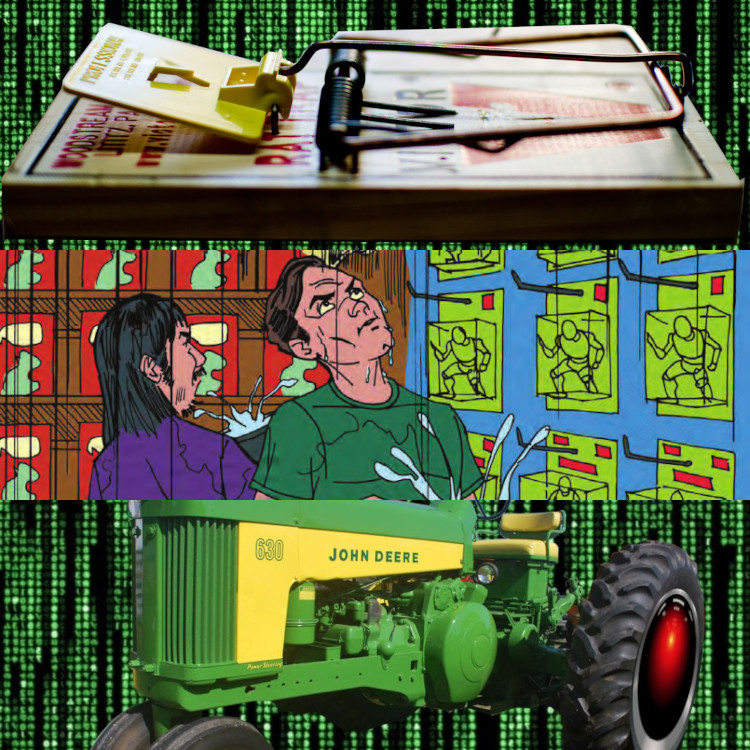
At its outset, American copyright provided for 14 years of exclusivity, renewable for another 14 years by the author, but - crucially - not by the publisher. This was a shrewd move by the US Framers, because it meant the publisher had to convince the author to file paperwork.
1/
1/

If you'd like an unrolled version of this thread to read or share, here's a link to it on pluralistic.net, my surveillance-free, ad-free, tracker-free blog:
pluralistic.net/2021/07/06/bac…
2/
pluralistic.net/2021/07/06/bac…
2/
Most authors have very little bargaining leverage at the outset of their publishing deals, and even when the author's prior accomplishments afford them some bargaining power, a new book is, by definition, an unknown quantity, and the fair price for it is debatable.
3/
3/
Then (as now), the majority of works are no longer commercially viable after 14 years. But for authors of the minority of works that thrive over long terms, renewal is an opportunity to reopen publisher negotiations from a position of strength.
papers.ssrn.com/sol3/papers.cf…
4/
papers.ssrn.com/sol3/papers.cf…
4/
The author could say, "When I sold you this book, neither of us could say how it would fare, so you paid me a modest sum. 14 years later, it is earning for you, and if you wish to continue to enjoy exclusive rights to it, I demand that you share that bounty with me."
5/
5/
If the publisher demurred, the author could simply walk away from the negotiations. The book's copyright would not renew, other printers could produce their own editions at or near the marginal cost. The publisher would lose all, the author would be no worse off.
6/
6/
Some form of renewal endured in US copyright for many years, and even after it was abolished, US copyright retained a measure intended to address creators' unbalanced negotiating power with their investors (studios, labels, publishers, etc): Reversion.
7/
7/
Essentially, US copyright lets creators to claim back their rights after 35 years (depending on the work's age), even if their contracts are for longer terms. This right can't be contracted away, either: a clause that says "I won't ever revert my rights" is not enforceable.
8/
8/
Reversion could allow creators to renegotiate their deals, but it has other benefits. For scholarly authors - who must sign away all rights, for free, to publish in journals that charge fortunes for access - it's a chance to get those works into the public domain.
9/
9/
For authors, it's a partial answer to the conundrum of ebooks and print-on-demand, which have made contractual reversion obsolete (publishers historically gave your rights back when the book was out of print, but ebooks and PoDs are never out of print).
10/
10/
And for creators who were tricked into signing away their rights, it's a chance to get them back.
But for all that, reversion is woefully rare, because the process is so complex, uncertain and obscure.
11/
But for all that, reversion is woefully rare, because the process is so complex, uncertain and obscure.
11/
For years, the @Auths_Alliance has provided tools for creators seeking to revert their works, but even with this assistance, the process is daunting.
authorsalliance.org/resources/righ…
12/
authorsalliance.org/resources/righ…
12/
Efforts to improve the system have been hampered by a huge data-void. The @CopyrightOffice's databases are woefully and infamously clunky, incomplete, out-of-date and under-resourced.
13/
13/
This is a crisis for all creators - if we want to sell our works, then having clear records of our claims on them is essential, first, so buyers can find us, and second, so we can prove that we have the right to sell.
14/
14/
The rights reversion data void hampers international efforts to improve copyright for creators, as in South Africa, where US entertainment cartels exploited the gap to sow fear, uncertainty and doubt in a bid to prevent South African authors from winning reversion rights.
15/
15/
Which is why "U.S. Copyright Termination Notices 1977-2020: Introducing New Datasets," published today, represents such a milestone. A group of Australian scholars present the first ever comprehensive data on US copyright reversions.
papers.ssrn.com/sol3/papers.cf…
16/
papers.ssrn.com/sol3/papers.cf…
16/
The authors - Joshua Yuvaraj, @rgibli, Daniel Russo-Batterham, @gengrant - scraped all Copyright Office data pertaining to reversion, painstakingly processed it, and published it. Here's the data:
melbourne.figshare.com/articles/datas…
and here's the codebooks:
melbourne.figshare.com/articles/onlin…
17/
melbourne.figshare.com/articles/datas…
and here's the codebooks:
melbourne.figshare.com/articles/onlin…
17/
The paper is up on SSRN today, and has been accepted for publication in the prestigious Journal of Empirical Legal Studies. It's an eye-popping read, and it reveals the truly dismal state - and vital necessity - of reversion.
18/
18/
Few creators have managed to revert but the ones that have are fascinating. @StephenKing is a leading reverter, as are @GRRMspeaking, Nora Roberts and David Eddings. - successful authors who are able to claim back their works and seek new deals based on their track records.
19/
19/
A single YA author - @francinepascal_ - accounts for nearly ALL the YA reversions, thanks to her reclaiming of all 305 of her #SweetValleyHigh novels (in kids' books, @AuthorAnnMartin attains another high-water mark for reverting the Baby-Sitters Club books).
20/
20/
But the most fascinating entry is funk titan George Clinton, who pursued his former manager Nene Montes for years, claiming he'd forged Clinton's signature and defrauded him to steal the rights to most of Clinton's prodigious and profitable catalog.
celebrityaccess.com/caarchive/geor…
21/
celebrityaccess.com/caarchive/geor…
21/
Thanks to reversion, Clinton was able to finally settle all question of title without expensive litigation - he simply reverted 1,413 works.
These are just the preliminary findings from this landmark, open-access dataset. Other researchers are encouraged to mine it further.
22/
These are just the preliminary findings from this landmark, open-access dataset. Other researchers are encouraged to mine it further.
22/
For policy-makers and creators' advocates, this data finally puts a sound evidentially footing beneath the debate over reversion. US reversion DOES help creators, but it is badly hamstrung by needless complexity and poor record-keeping.
23/
23/
Improving reversion - simplifying it, or even making it automatic at 25 years - is a no-brainer if you want to improve creators' share of the bounty of their most successful works.
24/
24/
Not coincidentally, Giblin (one of the authors) and I collaborated on THE SHAKEDOWN, a forthcoming book on how copyright, labor, contracting, and antitrust reforms could actually improve the creators' share of the profits from their labor.
pluralistic.net/2021/03/19/the…
25/
pluralistic.net/2021/03/19/the…
25/
• • •
Missing some Tweet in this thread? You can try to
force a refresh













